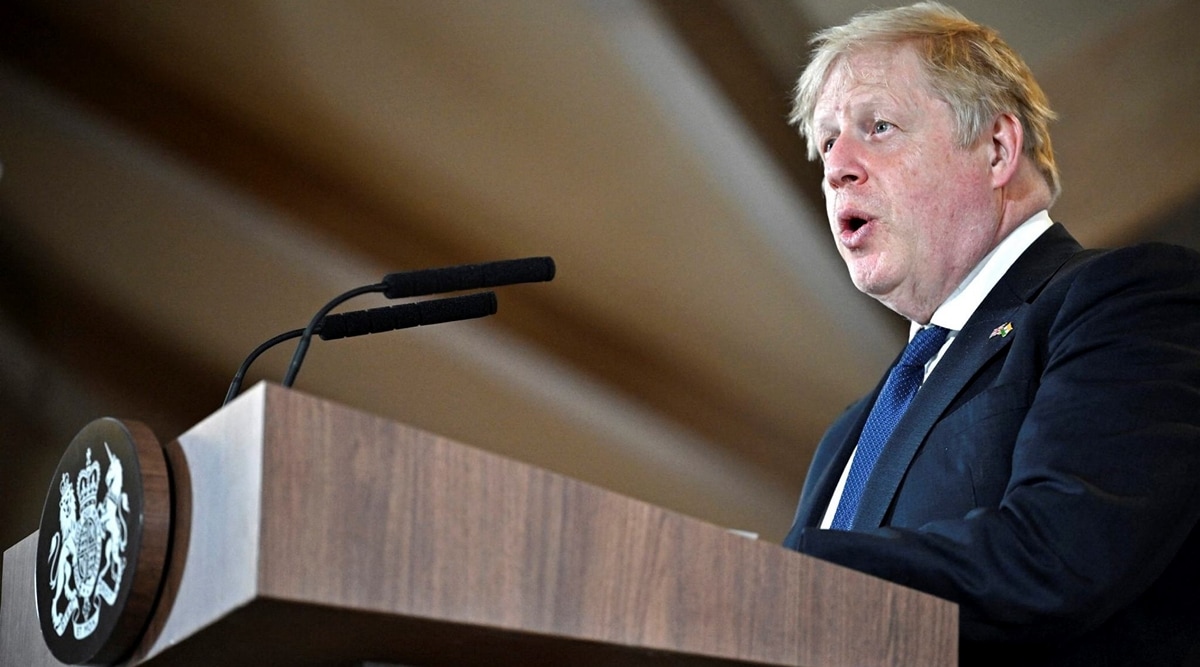 British Prime Minister Boris Johnson speaks during a news conference in New Delhi (REUTERS)
British Prime Minister Boris Johnson speaks during a news conference in New Delhi (REUTERS) British Prime Minister Boris Johnson said on Friday that economic offenders who want to use the UK’s legal system to evade the law in India are not welcome in the United Kingdom.
On the question of human rights issues in India, the British PM said that the UK raises these issues “privately” and “in a friendly way”. But he also said that India is a “great democracy”, where there are “constitutional protections for communities”.
Responding to questions about the extradition of fugitives Nirav Modi and Vijay Mallya, Johnson said, “I think there are legal technicalities that have made it very, very difficult but what I can tell you is that the UK government has ordered their extradition and we have said that from our point of view, we want them to be taken back to India for trial.”
#WATCH| On being asked about Nirav Modi, Vijay Mallya &Khalistani extremists,British PM Boris Johnson said,”We’ve set up an anti-extremist task force to help India…UK govt ordered extradition…We don’t welcome people who want to use our legal system to evade the law in India.” pic.twitter.com/rK3nV9xRG2
— ANI (@ANI) April 22, 2022
“We welcome people who have talent and brilliance coming from India to the UK, we don’t welcome — I want to make it absolutely clear now — we don’t welcome people who want to use our legal system to evade the law here in India. So, let me be absolutely clear about that,” he said.
Foreign Secretary Harsh Vardhan Shringla said, “On the issue of economic offenders, we have been pursuing this matter for some time at different levels with the UK. Our objective is to bring back those economic fugitives wanted in India to face justice in the country, and the matter did come up…it was conveyed that this is high priority…Prime Minister Johnson indicated that he was very sensitive to Indian concerns.”
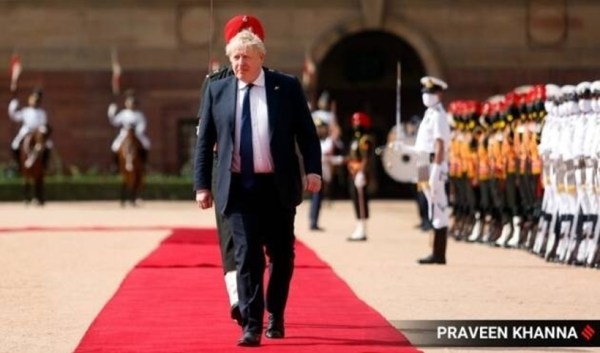 UK Prime Minister Boris Johnson received the guard of honour on Friday morning at Rashtrapati Bhavan in New Delhi. (Express/Praveen Khanna)
UK Prime Minister Boris Johnson received the guard of honour on Friday morning at Rashtrapati Bhavan in New Delhi. (Express/Praveen Khanna) 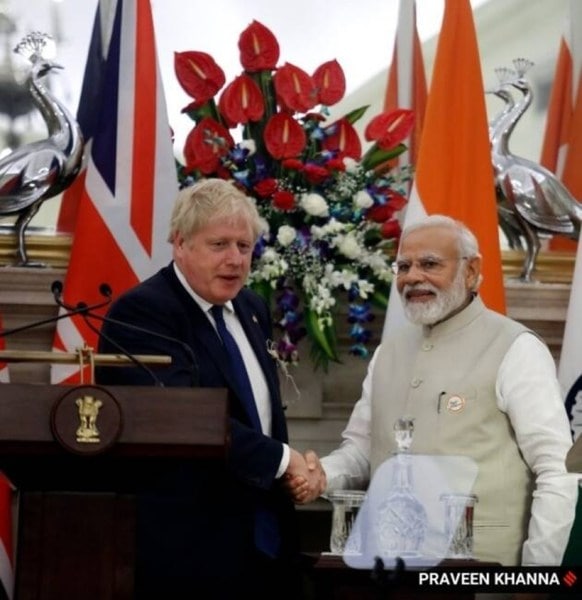 British PM Boris Johnson with his Indian counterpart Narendra Modi (Express/Praveen Khanna)
British PM Boris Johnson with his Indian counterpart Narendra Modi (Express/Praveen Khanna) On the human rights issues in India, Johnson said, “How we deal with questions about human rights or democratic values, of course, we have these conversations, but the advantage of our friendship is we can have them in a friendly and private way.”
“And I just want to say it is very important to realise that India has constitutional protections for communities, they are part of its Constitution. India is a very, very different country from autocracies around the world. It is a great, great democracy. It is a stunning shining fact that 1.35 billion people who live under a democracy, and that’s something we should celebrate and it offers, I say, an opportunity for closer cooperation and partnership…that doesn’t mean I’m not going to raise tough, consular questions as I have today, and other difficult questions. Of course, we do that, we do that as friends,” PM Johnson said.
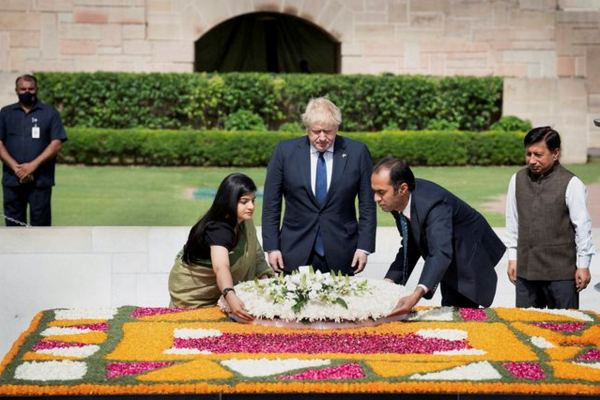 British Prime Minister Boris Johnson watches as a wreath is laid in tribute to Mahatma Gandhi at Gandhi’s memorial at Raj Ghat in New Delhi (REUTERS)
British Prime Minister Boris Johnson watches as a wreath is laid in tribute to Mahatma Gandhi at Gandhi’s memorial at Raj Ghat in New Delhi (REUTERS) 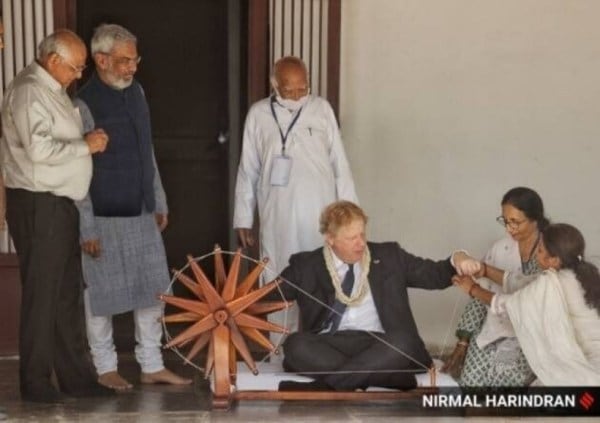 Johnson at Mahatma Gandhi’s Sabarmati Ashram in Ahmedabad on Thursday morning, where he tries his hand at the ‘Charkha’ (Express/Nirmal Harindran)
Johnson at Mahatma Gandhi’s Sabarmati Ashram in Ahmedabad on Thursday morning, where he tries his hand at the ‘Charkha’ (Express/Nirmal Harindran) On Afghanistan, the joint statement said that both sides expressed their serious concern about the humanitarian situation, violations of human rights and the hampered access of girls and women to education. “Both Prime Ministers called upon the Taliban to allow girls to return to secondary school,” the statement said.
The statement said that Prime Minister Modi acknowledged the role of the UK in co-hosting the UN Afghanistan Conference for the humanitarian response on March 31. Prime Minister Johnson acknowledged the role played by India in providing medical and food grain assistance to the people of Afghanistan, it added.
“The leaders reaffirmed the importance of United Nations Security Council (UNSC) Resolution 2593 (2021) which unequivocally demands that Afghan territory not be used for sheltering, training, planning or financing terrorist acts and called for concerted action against all terrorist groups, including those sanctioned by the UNSC. Both sides agreed to continue to provide immediate humanitarian assistance to the people of Afghanistan and reiterated the need for a representative and inclusive political system in support of a peaceful, secure and stable Afghanistan,” it said.
- The Indian Express website has been rated GREEN for its credibility and trustworthiness by Newsguard, a global service that rates news sources for their journalistic standards.

